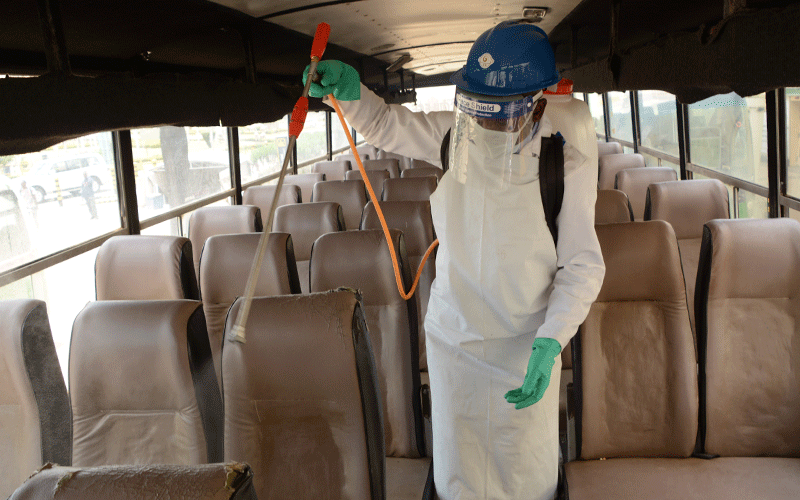Bus firms yet to meet State protocols

Alvin Mwangi and Harrison Kivisu
Most public transport operators plying long distance routes remain grounded as they rush against time to comply with the government’s protocols to curb the spread of Covid-19, days after President Uhuru Kenyatta lifted the ban on inter-county travel.
A spot check by the People Daily in various bus terminuses across the country established that most operators were in the process of fumigating the buses; servicing as well as replacing worn-out parts in readiness for take-off today.
The Ministry of Transport demands that a 14-seater PSV carries only 10 passengers, a 33-seater to have18 while a 51-seater to carry 30 passengers, including drivers and crews.
Fares across the country have been two fold with most operators saying the charges are meant to try and recover the losses they made when their businesses were grounded after Uhuru barred movement into and out of Nairobi, Mombasa and Mandera counties.
In Nairobi at the main Machakos Country Bus Station, normal day-to-day activities have resumed as several matatus and buses plying various routes have restarted operations.
Before the first two cases of Coronavirus were reported in Kenya, Machakos Country Bus Station was a beehive of activities, however, businesses were grounded to a halt thereafter.
Over the weekend, the fare from Nairobi to Western remained Sh3,000 instead of Sh1, 200 shillings.
Buses such as Honest Climax, Eldoret Express, Trans Mara, Nya Ugenya, the Green Bus, Nyamira Express, Kisii Deluxe, Nairobi Coach Company, Western Express, Mbukinya, Ngware-ini, Gusii De Luxe, Samia Express, Classic Express, and Makkah were also not left behind, as they were busy complying with the directives to enable them resume normal operations.
“We are ready to start operations and expect the numbers to go up. People still fear traveling, but we believe the business will go back to its best levels on time,” said Dennis Ng’ang’a, an operator with Honest Climax buses.
According to Ng’ang’a, most of their buses are yet to resume operations as they are still undergoing maintenance works.
Takes advantage
“Most of our buses have developed technical problems, which has forced us to spend more money to repair before releasing them back to the market,’ said Ng’ang’a.
Mosses Thiga, a trader in Nairobi said: “Travellers to Machakos are being asked to pay Sh1,000 from the ordinary Sh200.
The operators are taking advantage of us and yet we have also suffered economic challenges following the Covid-19 pandemic.”
The situation was replicated in other areas where fares were inflated. At the Tea Room Stage, which hosts several routes including Nyeri, Murang’a, Nakuru, Meru and Embu, passengers were forced to dig deeper in to their pockets to afford the fares.
Passengers travelling to Embu were asked to pay Sh1,000 instead of the usual Sh500.
And in Mombasa County, the situation was no different as passengers traveling upcountry were being forced to contend with exorbitant costs of travel as fares on key long-distance routes have risen by up to 67 per cent.
Mwembe Tayari, Bus Station in Mombasa continued to witness an influx of travelers, going to upcountry and who were previously locked up in the counties due to the cessation of Movement.
A survey by People Daily established that the cost from Mombasa to Nairobi is now between Sh2,000 and Sh2,500 to Nairobi while that of Mombasa to Kitui is between Sh2,500 and 3,000 depending on the bus company.
According to David Kamosu, manager of Kathi Safaris, which pays Mombasa-Nairobi and Kitui route, said every vehicle is charged Sh2,000 to get certification clearance from the Mombasa County Health Department, and, therefore we have increased fares.
“We are charging Sh2,000-2500 to Nairobi because the cost of getting the certification is high, also, the number of passengers we are carrying per bus is limited therefore to recover the cost, we are charging more,” Kamosu told People Daily.









